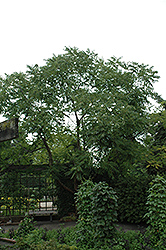It's all about ...
plants

Height: 40 feet
Spread: 40 feet
Sunlight:
![]()
![]()
Hardiness Zone: 6b
Other Names: Cedrela sinensis, Chinese Mahogany
Description:
A relatively uncommon tree from China with large, exotic compound leaves that hang loosely on an open structure; a nice shade tree for its tropical yet unusually coarse appearance, although it tends to sucker; by far the hardiest of the mahogany family
Ornamental Features
Chinese Toon features airy panicles of white flowers at the ends of the branches in late spring. It has dark green deciduous foliage which emerges brick red in spring. The narrow compound leaves do not develop any appreciable fall colour. The peeling brown bark adds an interesting dimension to the landscape.
Landscape Attributes
Chinese Toon is an open deciduous tree with a more or less rounded form. Its relatively coarse texture can be used to stand it apart from other landscape plants with finer foliage.
This tree will require occasional maintenance and upkeep, and is best pruned in late winter once the threat of extreme cold has passed. Gardeners should be aware of the following characteristic(s) that may warrant special consideration;
- Suckering
Chinese Toon is recommended for the following landscape applications;
- Shade
Planting & Growing
Chinese Toon will grow to be about 40 feet tall at maturity, with a spread of 40 feet. It has a high canopy with a typical clearance of 6 feet from the ground, and should not be planted underneath power lines. As it matures, the lower branches of this tree can be strategically removed to create a high enough canopy to support unobstructed human traffic underneath. It grows at a fast rate, and under ideal conditions can be expected to live for 60 years or more.
This tree does best in full sun to partial shade. It is an amazingly adaptable plant, tolerating both dry conditions and even some standing water. It is considered to be drought-tolerant, and thus makes an ideal choice for xeriscaping or the moisture-conserving landscape. It is not particular as to soil type or pH, and is able to handle environmental salt. It is highly tolerant of urban pollution and will even thrive in inner city environments. This species is not originally from North America.
This plant is not reliably hardy in our region, and certain restrictions may apply; contact the store for more information.
